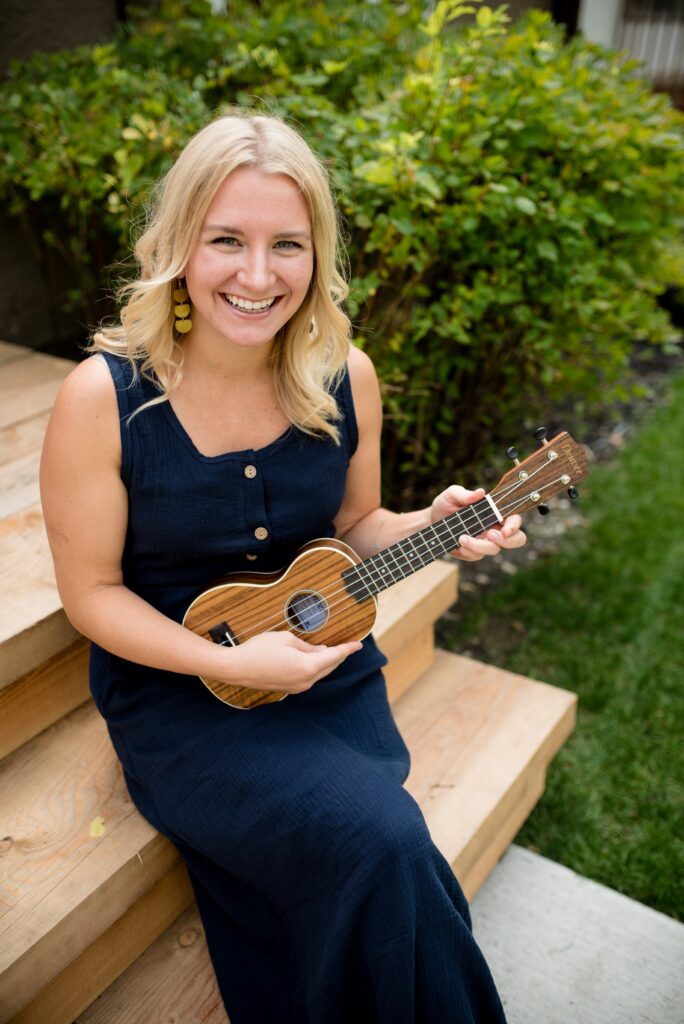“Every day in the hospital I am reminded of the healing power of music and the way it is able to break down barriers with kids and families. I love that singing the theme song to a child’s favourite TV show can create an instant bond; that entering into a child’s imaginary play with their beloved stuffy or favourite toy can open a door to their world; and that singing a silly song gives them permission to let their guard down in an unfamiliar and often scary place.”
– Lacey Friesen, Music Therapist
I guess you could say that music runs in Lacey Friesen’s blood. Her role as a Music Therapist at HSC Children’s Hospital could not be better suited to her interests, personality or way of life.
“I grew up in a very musical family, with a mother who taught private music lessons, a father who plays drums and sings, and two musical sisters. We grew up singing in church together,” said Lacey. “There was just so much music around me.”
Lacey hails from Rocky Mountain House, Alberta, a town of 8,000 residents with the slogan, “Where adventure begins”, and located roughly 80 kilometres west of Red Deer at the confluence of the Clearwater and North Saskatchewan Rivers.
Growing up, Lacey’s love for music was strong. She started with piano and singing, joined band in elementary school playing clarinet and saxophone, and eventually learned guitar. But healthcare was calling out to her.
“As a child, I had it in my head that I was going to work in the Calgary Children’s Hospital one day, and after high school I began looking at my options. I was considering physiotherapy or occupational therapy when I stumbled upon ‘music therapy.’ I had no idea this thing even existed.”
Right then, Lacey started researching what it would take to become a Music Therapist and she applied to Winnipeg’s Canadian Mennonite University (CMU) in 2015.
“As part of a degree in Music Therapy, students need to do a 1,000-hour internship. I was so lucky to end up with music therapist, Cecilia Bellingham, as my supervisor at HSC. And then it all just unfolded for me as a position opened up. I jumped at the opportunity and I am still here today. This is such a great career and I am so lucky to be able to do what I love.”
Lacey and Cecilia are still a dynamic duo, with just the two of them working in the Children’s Hospital. Their work includes individual sessions on each of the units, and some groups both in CancerCare, PsycHealth and in the patient playroom.
“We work very closely with HSC’s child life specialists, so I come in to work and together we identify the priority patients and confer on how best to approach the week. We discuss who would benefit most from music therapy – who could use some calming tunes leading up to or after a painful or uncomfortable procedure or treatment; who’s feeling good and needs a safe outlet for their energy and could benefit from a positive, fun-filled interaction. Some days I come in prepared with ideas and end up throwing them out the window because a child I planned to visit is just too sick for a high-energy session, or vice versa: I planned a quiet relaxing session and they are up for a party! We are constantly improvising and adapting.”
According to Lacey, one of the beauties of music therapy is that children have a say, a sense of control and some autonomy.
“These kids are in hospital, sometimes for a very long time, and they rarely have the option to say no. Most have to face blood work pokes, IVs, dressing changes, meds, etc. With me, they can direct the session, choosing whether they want relaxation or some laughs and silliness, depending on how they feel. It’s also something they can say ‘no’ to.”
Lacey says that what has amazed her most is just how much kids open up with music. As soon as she walks into a child’s hospital room, she begins looking around for clues that point her to something they love, like a Paw Patrol lunch kit, a dinosaur stuffy, a movie or a book.
“It’s so important to build a level of trust and make a connection. On top of that, it is vital that we are aware of the medical environment that we’re walking into. We have the benefit of observing the positive physiological changes when a child is connected to a monitor. We see that during our sessions, oxygen saturation increases, and respiration rate and heart rate decrease. But once we get going, it’s also so wonderful to see their little faces light up, and to know they might be feeling some joy and a sense of normalcy, even just for a brief time that day.”
Lacey and her husband, Jason, have one son, aged 15 months, who had a recent visit to children’s emergency after he suffered a fall down the stairs that broke his little leg.
“I had the ‘unfortunate privilege’ of seeing my coworkers in action while my son was on the receiving end of care. Honestly, it was incredible to see the impact the music and play had on him during the painful experience. After having been on ‘the other side’ of treatment, I see even more how parents with sick and injured children are suffering for them. It is a terrible thing to see your child in pain and I am so grateful to be part of a team that aims to brighten the lives of patients and families during challenging times.”
In addition to HSC’s Children’s Hospital, CancerCare and PsycHealth, Music Therapists work in private practice and in personal care homes with older adults.
THINKING ABOUT A CAREER AS A MUSIC THERAPIST?
Music therapy is a discipline in which Certified Music Therapists (MTAs) use music purposefully within therapeutic relationships to support development, health and well-being. Music therapists use music safely and ethically to address human needs within cognitive, communicative, emotional, musical, physical, social and spiritual domains.
Music Therapy is a four-year degree or two-year after-program, and includes music lessons, theory and history, as well as intensive melodic study and some counselling courses mixed in. Music therapists are certified by the Canadian Association for Music Therapy after successfully completing a board exam, and abide by CAMT’s Code of Ethics.


